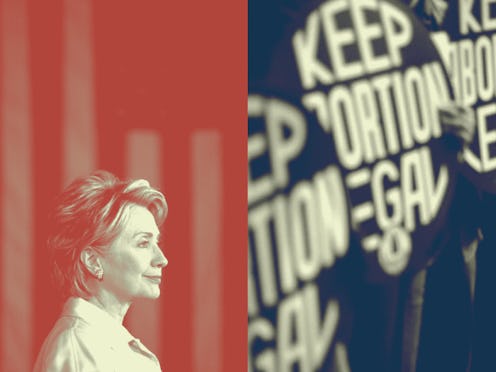News
A Timeline Of How Women's Rights & Hillary Changed

It's been nearly 100 years since American women gained the right to vote with the ratification of the 19th Amendment, and in all that time, no woman has ever been a serious contender for the nation's highest elected office. In fact, America is only just now embracing the first woman to ever be nominated for president by a major political party. Presumptive Democratic nominee Hillary Clinton is the closest the United States has ever come to a female president. Even her most ardent critics can't deny the historical significance of Clinton's presidential campaign. Her campaign is undeniable proof that women have smashed through a glass ceiling or two. But how have women's rights evolved over Hillary Clinton's lifetime? A comparative look back at major moments in both Clinton's life and developments in women's rights shows us just how far we've come in the last 69 years.
While we've come a long way from the days when women were shut out of voting booths, there's still work to be done before they truly enjoy the same sense of equality men do. And while there’s no way of knowing now if Clinton will defeat Donald Trump in the general election to enter the White House as America’s first female president, she’s seen (and contributed to) a lot of strides in the ever-ongoing women’s rights movement.
However you feel about her politics, it’s hard to claim that Clinton wasn’t blazing a trail of female empowerment long before her presidential aspirations began to take shape. After obtaining her Bachelor of Arts from Wellesley College in 1969, Clinton enrolled in Yale Law School. It was Yale’s first year as an officially coeducational university, and Clinton was among the first women to be admitted to the school. When she graduated in 1973, there were only 27 women in her entire graduating class.
A few years after receiving her Juris Doctor from Yale, Clinton became the first woman to be made a full partner at Rose Law Firm in Little Rock, Arkansas, in 1979. Two years after her husband was sworn in as president of the United States, Clinton took her fight for gender equality to the international arena, declaring, "If there is one message that echoes forth from this conference, let it be that human rights are women’s rights and women’s rights are human rights" in her 1995 speech at the United Nation’s Fourth World Conference on Women. "Let us not forget that among those rights are the right to speak freely and the right to be heard."
The fight for gender equality and the continued advancement of women's rights have long been a cornerstone of Clinton's personal and professional life. Over the course of her life, Clinton has seen much of women's uphill struggle against discrimination and antiquated sexist ideas firsthand. Should her attempt to become America's first female president fail, Clinton will still undoubtedly end up in the history books as a pioneering woman in politics thanks to her grit, determination, and bold trailblazing.
Images: Tina Gong/Bustle